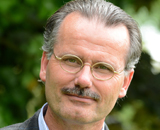 We all know that healthcare faces huge challenges—budget cuts, increasing demand, and a shortage of skilled personnel. To help find solutions to this, conferences are set up to discuss the changes needed.
We all know that healthcare faces huge challenges—budget cuts, increasing demand, and a shortage of skilled personnel. To help find solutions to this, conferences are set up to discuss the changes needed.
But most of these conferences happen without the people they are all about—patients. “When people are talking about you and you’re not at the dinner table, this mostly means you’re on the menu,” someone said to me, referring to the lack of patients at healthcare conferences. At conferences about doctors one would expect to meet doctors, so why not include patients in healthcare conferences too?
In Spring 2009, I started to ask patients to stand up at the conferences I had organised and share their stories. After that, in February 2012, I launched the patients included™ act, which says:
“I will ‘NO-SHOW’ at healthcare conferences that do not add patients TO or IN their programme or invite them to be IN the audience. Also I will no longer give lectures/keynotes at ‘NO-SHOW’ conferences.”
Over the course of the past few months it is good to see a change occurring. More and more conference organizers have already acted and invited patients to participate in discussions or give a talk or are thinking of doing so. For example:
- Medicine X Stanford
- Medicine 2.0 Harvard
- TEDMED Washington DC
- Doctors 2.0 Paris
- World Parkinson’s Disease conference
- TEDxMaastricht
- TEDxNijmegen
- FutureMed
- Saskatchewan Health Quality Council Summit
- Patients in Power 2012 Athens
- Cleveland Clinic : personalized healthcare summit
- Patient Safety Conference Dutch Healthcare Inspectorate (100 patients out of 600 visitors)
This is good news. However, there are still an awful lot of conference organizers out there who don’t get it.
Let’s take one example out of many: the World Health Summit 2013, due to take place in October in Berlin.
In the announcement it reads “One thousand representatives from all health related fields: Top-level scientists, political leaders, CEOs from industry, representatives from civil society and foundations, executives from the healthcare systems, students and young professionals.” And their vision and goals start with: “Bring together all stakeholders on an equal level.”
But something or rather someone is missing here—what about patients? They’re not in the programme or on the advisory board.
I salute them for organising great conferences on healthcare multiple times a year all around the world. But even in the welcoming address the word “patient” isn’t mentioned. When I asked why, I was told to get in touch about possible ideas for future years. Great, but that was the response last year as well… so I would be most willing to help them make a real statement next year and a first step this October.
It is not only important to make sure that patients are invited to conferences, but also that they are able to participate. It is bizarre to see that some organizers think that inviting a patient along is a checkmark or an asset you can “order.” At the REshape & Innovation Center of the Radboud University Nijmegen Medical Center, we have even had organizers call us to see if we could provide “something like a patient” for them. For that reason we trademarked our logo, just to be sure that it is only used as intended. It’s free to use for every conference.
It is clear that there is not a “one size fits all” for this, and maybe we should include different levels of self-certification. At one point e-Patient Dave sent me a tweet saying : “How about a 5-star rating for your Patients Included™ Act ?” This seems like a logical next step. We started to write about what the different levels should or could be. Should it be from 1 to 5, or should it include negative ones like minus 1 star? I think it has to be a simple, understandable, recognizable format, so we sticked to the 5 star format.
But in thinking about what each star should stand for, it suddenly struck me that we were almost stepping into the same old pitfall of filling in the blanks for those of you out there. So that’s why I need your help. And why I would like to ask: patients and healthcare professionals. Would something like that be helpful?
Lucien Engelen, (@lucienengelen on twitter) is director of REshape & Innovation Center of the Radboud University Nijmegen Medical Center, the Netherlands. Faculty FutureMed at the Singularity University, Silicon Valley USA.
No conflicts of interest.